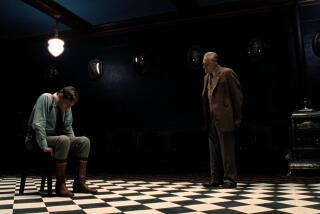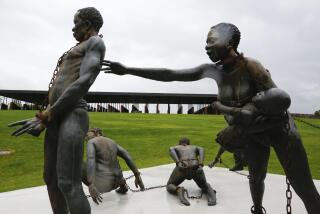Book Review : Hale’s Dispassionate View Nearly Captures Passion
- Share via
The Jailing of Cecelia Capture by Janet Campbell Hale (Random House: $15.95)
Earnestness may be the hardest quality to evaluate in a novel, because one wants so to like what is earnest and sincere. “The Jailing of Cecelia Capture” is an immensely earnest novel marred by old-fashioned, soap-operaish movement through time and space (flashbacks are routinely cued by something in the present that directly suggests the past event, without subtlety, dream-logic or sensual association), stodgy and uninteresting language, and a literal-mindedness that seems to work hard to flatten the characters rather than bring them to life. The last is most damning, because the main character, Cecelia, whose memories and emotions we should feel powerfully, becomes an automaton programmed by the author to make certain points rather than a real being whom we believe in.
Cecelia Capture is a 30-year-old Native American woman who has lived through a poverty-stricken, dismal childhood on and off reservations, the birth of an illegitimate child at 16, the death of that child’s father in Vietnam and marriage to a phony liberal, to finally fulfill her grandfather’s dream for her father: She attends Boalt Law School and is a successful student, though her fellow students view her as oddly detached, unapproachable. To stay in this prestigious law school, she has allowed her husband and two children to move away from her; she has had sexually degrading affairs; she drinks too much. And she winds up, on the evening of her birthday, in jail in Berkeley for drunk driving.
Period of Reflection
In jail, Cecelia’s time for reflection on her life creates the flashback structure of the work; for example, Cecelia thinks about the false name of Carmen that she gave to a man who tried to pick her up in a bar, and then remembers a period of Carmen Miranda fixation when she was a child: voila, flashback. This seems to be the type of free association one learns about in a Psych 1 course as an undergraduate, and all works too cleanly, too tamely, making Cecelia seem a puppet, a television series character.
Here is Janet Campbell Hale describing Cecelia’s one sexual encounter with another American Indian, a jumble of mixed metaphors and flat, uninteresting language: “This was what was meant by ‘burning desire.’ That was how it was now, like a fire that grew furious and spread and ignited him, spread out of control, and she didn’t care. All thoughts fell away and she was freed of ordinary things. She could sense her orgasm just in sight on the road ahead, and she went eagerly to meet it.” The awkwardness of that particular image is what is wrong with the prose in general: Hale refuses to give Cecelia an ounce of poetry to her soul, an ounce of real passion; she sees her as distantly as her fellow students do. Because of that, we readers regard Cecelia that way as well, and view her plight as dispassionately as an overburdened social worker might.
More to Read
Sign up for our Book Club newsletter
Get the latest news, events and more from the Los Angeles Times Book Club, and help us get L.A. reading and talking.
You may occasionally receive promotional content from the Los Angeles Times.










